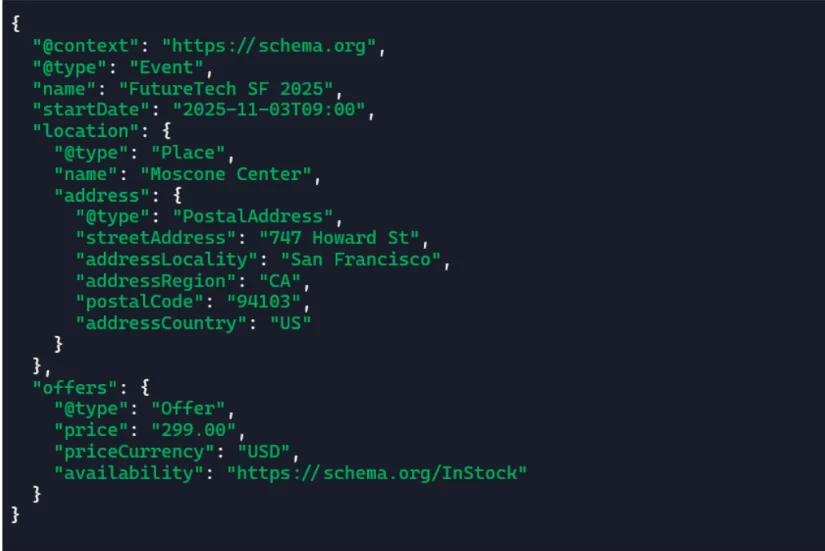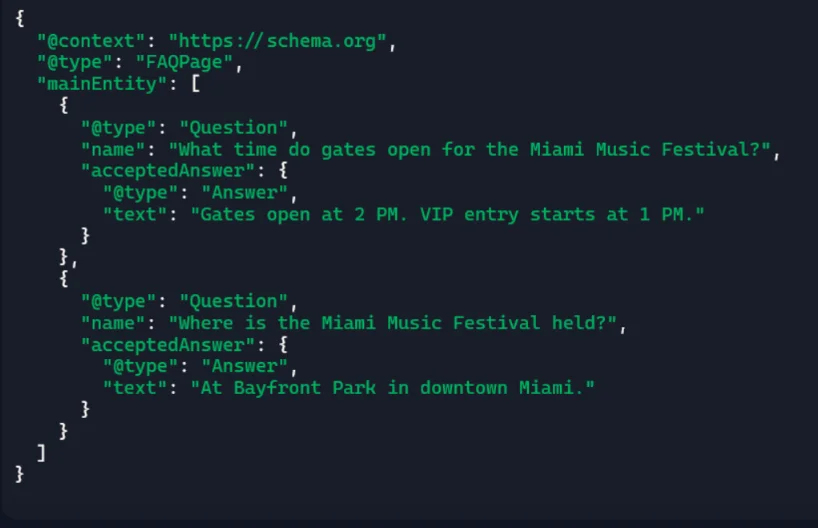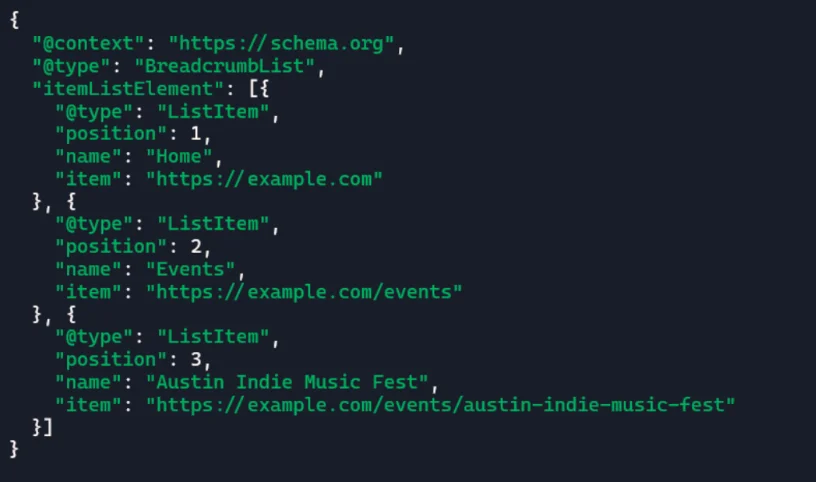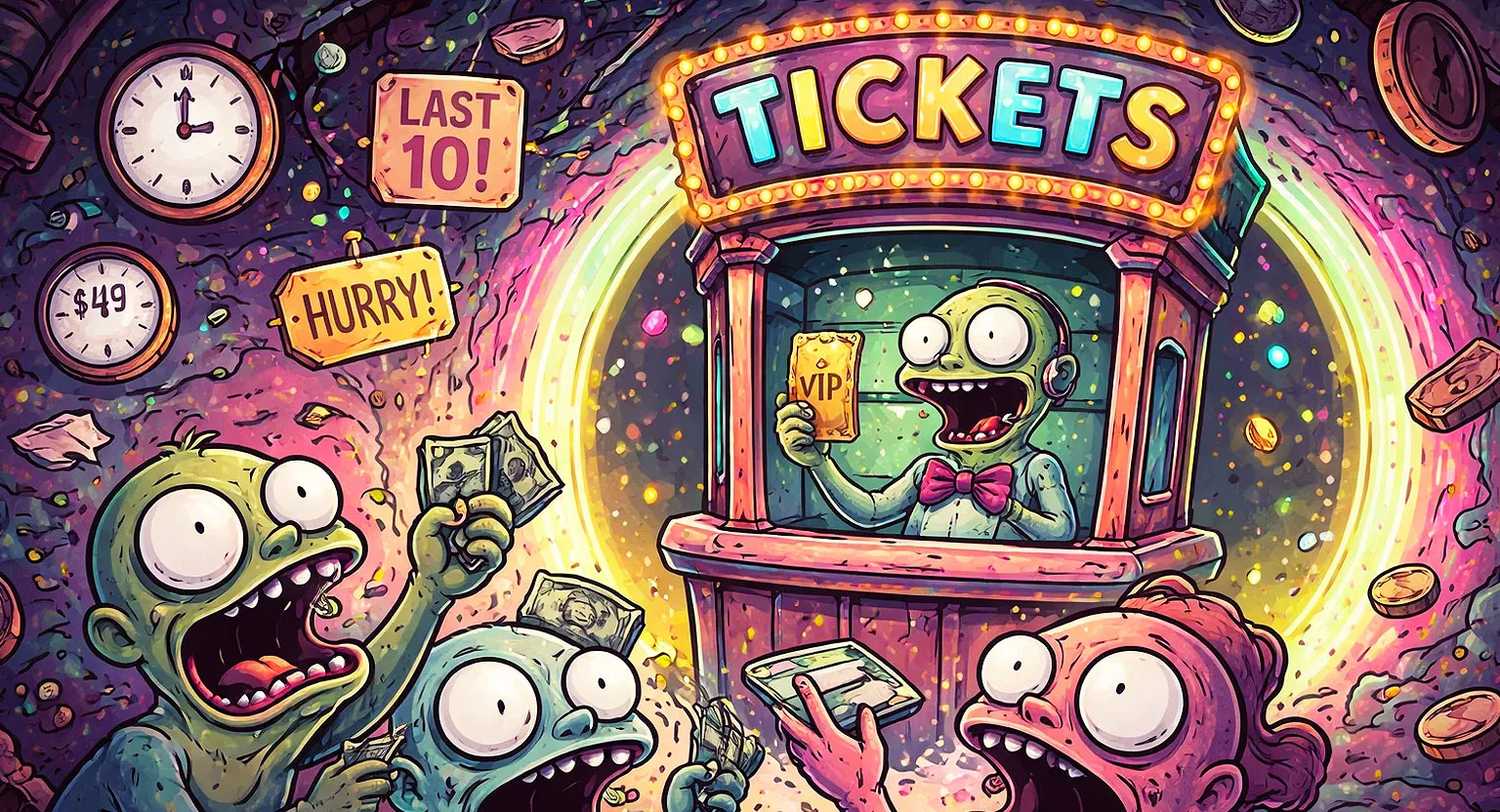Is effective event SEO key to high ticket sales? It certainly is!
You’ve done everything on your event organization checklist: you have booked the venue, set the schedule, polished your agenda… Even your event page looks amazing. Tickets are technically on sale, but the sales are not as good as you’d expected. Are you feeling the pressure and about to start panicking? We have a better idea!
It is not because people are not interested in your event. It is because your event isn’t showing up where people are searching. SEO exists just for that. In the right hands, it can do wonders, so make sure to use it to make your event marketing highly effective.
If you are not familiar with the concept, no worries. We have an ultimate guide to the best event SEO practices prepared for you. Read it and start implementing those now. Alternatively, you can make your life easier and let TicketsCandy have it set up for you, as those and other best practices are used in TicketsCandy’s internal event pages.
What Is SEO in Event Marketing?
SEO in event marketing means optimizing the event website to increase visibility, drive more organic traffic, and sell more tickets. To ensure this happens, you need to understand how search engines work, how people search for information, and what keywords and phrases they use. That knowledge is the starting point that allows you to optimize your event website to rank higher in search engine results pages (SERPs) when users search with specific words or phrases.
Most strategies are common for all purposes, while others are event marketing-specific. Both types should be taken into consideration and implemented to actually have higher click-through rates and more registrations or ticket sales.
6 Event SEO Essentials for Better Ranking, Conversion, and Selling Out
Effective SEO for event marketing incorporates everything from website structure and mobile optimization to keyword usage and content strategy. These six essentials will help your event pages rank higher, convert better, and sell out faster, regardless of the scale of your event. They work for both local concerts and global conferences.
Structured Data (Schema Markup)
Structured data is powerful for enhancing your event website’s visibility and user experience. So, having it set up is a “behind the scenes” that should be done. Customers won’t see it, but it will help them come to your website and discover your event.
What is schema markup? Putting it simply, it is a piece of code that describes different types of content according to a predefined structure that is easily recognized by a search engine. For instance, if you are organizing a concert in San Francisco and add event schema markup, a search engine will see the location, date, and ticket price information and can display it directly in the search results.
When it comes to event page optimization, here are the three schema markups to be added:
- Event Schema – perfect for giving users a quick overview of key event details (like time, place, price etc.).
- FAQ Schema – great way to answer common attendee questions directly in search results.
- Breadcrumb Schema – excellent for improved site hierarchy and navigation.
Event Schema
Event Schema tells search engines that your page is about a specific event. It enables rich snippets, meaning all the key details appear in search results. Search engine crawlers consider this information useful and rank your webpage higher.
Let’s say, you are organizing tech conference in San Francisco. Here is what the event schema for it can look like:

FAQ Schema
In plain words, it is a markup of questions and answers so Google can display them directly in search results. Use it to get increased SERP and reduced bounce rate by setting expectations.
Easy FAQ schema example is below. This one is for a music festival in Miami, but it can be adjusted to any event you need to sell tickets to.

Breadcrumb Schema
Breadcrumb Schema shows the page’s position within your site hierarchy. It helps both users and search engines understand how content is organized.
How can it help you with event promotions and ticket sales? It improves navigation in search results, enhances UX by showing content structure, and supports better indexing and crawling.
Here is how to create it with JSON-LD:

How to Add Schema Markup?
As you can see from the examples above, schema markup requires writing a piece of code and inserting it into your webpage. It might be an overwhelming task if you are not familiar with coding or do not have an IT guy in your team.
How can you still do it on your own? If you are using WordPress for your event website, the easiest way to add it would be using a ready-made WordPress plugin. if you are to build your website first, then do not hesitate to use WordPress, as it is highly convenient and requires the least technical knowledge.
If you already happen to have a website built on another service, then you might like to explore tutorials for your specific service. Here are the Wix schema tutorial or Squarespace schema tutorial in case your event website built on one of those.
Keywords and Content Optimization
Those words people type in search engines when looking for something (e.g.,”buy tickets to a concert”, “concerts in Miami in June”) are SEO keywords that help search engines understand what your page is about and match it to relevant content. Experienced SEO experts would tell you never to miss a chance to use keywords in titles, headings, meta descriptions, and they are absolutely right!
The impact of the right keyword usage for increased ticket sales is hard to exaggerate. Indeed, good keywords do wonders, as they can:
- Drive organic traffic from interested users.
- Improve visibility in local search and “near me” queries.
- Help search engines understand context, location, and relevance.
General vs. Local Keywords: What’s the Difference?
While general keywords attract wide audiences, they lack conversion power. Local and hyperlocal keywords target users actively looking for events in a specific area and convert better.
| Keyword Type | Example | Intent Level | SEO Value for Events |
| General | music festivals | Broad | Low to Medium |
| Local | music festivals in Miami | Geo-specific | High |
| Hyperlocal | Bayfront Park EDM concert | Venue-specific | Very High |
Never ignore local keywords. Ever. They’re your ticket to relevance, visibility, and conversions. We will tell you even more. Built your keyword strategy around local keywords.
Step-by-Step Guide to Keyword Optimization (and How to Use Them in Your Content)
Knowing your keywords that can boost conversion is half of success. The other half depends on how good you are with using them in the content published on your website. Here are several effective tips that ensure the usage of keywords is not just a tick on your to-do-list, but an effective SEO move.
1. Research Geo-Modified Keywords
You can use tools like Google Keyword Planner, Ahrefs, or Semrush to find keywords with high search volumes, clear local intent, and low-to-medium competition. Some of the great examples are: “events in [city]”, “[genre] concerts near me”, “[venue] live music schedule”.
2. Map Keywords to Page Types
Mapping keywords to page types means choosing the right search phrases for each kind of page on your website. Do this based on what that page is about and what users are likely to search for:
- Homepage might target broad, branded keywords like “Miami Music Festival 2025” because it introduces your overall event or brand.
- Event Page would use specific keywords like “EDM concert at Bayfront Park” to match what people search when looking for that exact show.
- Blog Post could target questions or trends like “What to wear to a summer music festival” or “Top 5 EDM artists in 2025”.
3. Optimize On-Page Elements
This means ensuring that meta title and description, heading and subheadings, as well as the main text contains keywords (preferably local ones):
- Meta Title and Description: Use main keywords there. Keep titles under 60 characters and descriptions under 160 for ideal display in search results.
- Headings (H1, H2, H3): A keyword in H1 (the heading of the entire article) is a must. For all other headings, it is advisable, but not obligatory. Do not hesitate to omit them if they do not fit in naturally.
- Main Text: That is where you can shift the focus from main keywords to all you that bring value and conversion based on your analysis. The more of them you add, the better. However, they should be used organically. It is better to skip keyword, then make it sound forced.
Moreover, do not forget to add alt text to the images you use. Alt text is like a meta description in a text, but for an image. Use main keywords there as well.
Simple, right? But it always works!
Once you are done with keywords, it is high time to work on writing. Keep in mind the following aspects:
- Uniqueness
- Readability
- Engagement
Make sure to apply them to the text that describes your event and everything around it. While uniqueness is more of a Google crawling thing, engaging and useful pieces of text are about the reader’s preferences. Make sure to keep both sides satisfied.
What to Write About?
Event description is a must. However, you might also include performer bios, schedule breakdowns, and venue details, and scale your event promotion with blog posts or guides. The exact content plan really depends on the type of event and its UPS.
Core Web Vitals
To put it simply, Core Web Vitals are key metrics a search engine uses to measure how user-friendly your site is. Core Web Vitals are critical for event SEO, as they define how quickly your page loads, how quickly your page responds to clicks, and whether any part of the content jumps while the page is loading. Having those things optimized works well not just for rankings, but for keeping impatient users engaged long enough to convert.
How to improve performance via optimization of those metrics?
- Compress images using formats like WebP to reduce load time.
- Implement lazy loading for below-the-fold visuals.
- Clean up code by removing unused scripts and deferring non-critical JavaScript.
- Prioritize above-the-fold content, so users see key info faster.
There are a lot of WordPress plugins that can help you optimize Core Web Vitals, and WP-Optimize and LazyLoad are among those you would like to have in your arsenal.
Accessibility
Accessibility optimization of your event website is mainly about inclusivity. In other words, it is a way to ensure that everyone can use a site regardless of physical or cognitive abilities. If you expect that your event will be of interest to individuals with disabilities, this one is a no-miss. Ensure that you have a website and digital content that can be accessed and read by them.
What can you do?
Even though search engines do not have “ranking bonuses” for inclusive content, they do pay attention to overall user experience. Semantic HTML (like header, nav, article, footer) and ARIA roles (extra labels you add to HTML to help screen readers understand custom or complex elements) are essential. The former improves crawlability and ranking, while the latter make your site usable for everyone, including those using screen readers.
2. Make ticketing forms and CTAs accessible to all users
Ensure labels, error messages, and focus states are clear. For example, “Buy Tickets” buttons should be reachable via keyboard and screen reader, with proper ARIA labeling.
3. Ensure full keyboard accessibility across the site
Keyboard-friendly navigation improves usability and engagement metrics, reducing bounce rates and boosting time-on-site. Both positive signals for search engines. What is more important, it ensures that users with motor impairments or those relying on screen readers and other assistive tech will be able to interact with menus, buttons, and forms. For example, tabbing through a registration form should follow a logical order, with visible focus states and no traps.
4. Use well-structured, accessible tables for event data
Why to spend time on this? Properly marked-up tables enhance crawlability and semantic clarity, especially for structured data like schedules or pricing.
When making a table accessible, make sure to:
- Use `<th>` with `scope` attributes.
- Include captions.
- Avoid layout misuse.
For example, a ticket pricing table should clearly define column headers like “Tier,” “Price,” and “Benefits” for screen readers.
When you connect one page to the other page on your website, it is called internal linking. Frankly, It is rather straightforward, but still, let’s have a closer look at this strategy, as it can strengthen site architecture, improve crawlability, and keep users engaged longer. How? Consider the following things.
This builds relevance and encourages exploration. For example, a link from a concert page to the artist’s interview or the venue’s upcoming lineup can increase conversion, among other things. The longer users stay, the more likely they are to buy tickets, share the event, or sign up for updates.
It helps users understand where they are and navigate back easily. They might also find it easier to discover other events, artists, or venues, which can eventually lead to increasing ticket sales and newsletter signups.
Mobile Optimization
When you adapt your website to provide a seamless, user-friendly experience on mobile devices like smartphones and tablets, it is called mobile optimization. And with most event traffic coming from smartphones, mobile optimization is a must. Especially given that a smooth mobile experience reduces bounce rates and increases conversions during time-sensitive promotions.
To maximize event ticket sales on mobile, you can prioritize portrait mode layouts, large tap targets, and intuitive navigation. Moreover, focus on key actions like “Get Tickets,” “View Schedule,” or “Add to Calendar.”
Compressing images, minimizing scripts, and using lazy loading are great for loading speed. Great news is that you will have those done as soon as you optimize your event page for Core Web Vitals. No extra work here. Still, test those points across devices to confirm that content scales properly and remains readable.
15 Easy Marketing Tips to Combine with SEO Actions
To maximize the effectiveness of SEO strategies, do not ignore marketing tips and tricks. Here are some of the ideas to implement on your event page that work perfectly when combined with SEO actions.
1. Optimize for “near me” and city-based keywords
Most users actively search for events nearby. Take advantage of it to attract locals to your event. Optimization of the “near me” is also essential for geo-targeted discovery and last-minute ticket buyers.
2. Include performer/artist names in metadata
Fans often search by artist name. So, let potential visitors know what they are buying.
3. Add ticket urgency phrases: “limited seats” or “early bird ends soon”
This one is super simple, but highly efficient. Use any wording that triggers urgency and FOMO. Those are key to quick conversion.
4. Embed Google Maps with venue schema
This schema markup can include venue name, address, geo-coordinates, and even parking info – making it easier for users and search engines alike. It is essential for walk-in events, festivals, or pop-ups where location clarity drives attendance.
It builds internal linking, keeps users engaged longer, and signals relevance to search engines.
It is a good way to build trust and add keyword-rich content that improves engagement. What to use? Include quotes from past attendees, artist shoutouts, or influencer testimonials.
7. Add structured data for ticket availability
With schema markup (Event, Offer, availability), Google can show “InStock,” “Limited,” or “Sold Out” directly in search results. It can drive urgency (when you see “Only 5 tickets left”, you want to be among those five lucky ones who bought tickets on time) and improve discoverability. Events with structured data are more likely to appear in Google’s event carousel or local listings.
8. Add “Things to do in [City]” content
Benefits are multiple. It captures broader intent, positions your event as part of the city’s vibe, and improves internal linking.
This one can boost discoverability across platforms and encourages user-generated content.
10. Use schema for performers, sponsors, and organizers
It adds depth to your structured data and increases chances of rich results.
11. Add a countdown timer or dynamic date element
Great way to encourage urgency for potential attendees and signal freshness to search engines.
12. Translate event pages for multilingual audiences
If you expect to have international guests, of course.
13. Include a clear call-to-action above the fold
Old good CTA is always effective. Be creative and use bold buttons with contrasting colors, keep copy short and action-oriented.
14. Add a “What to Expect” section with keywords
Use it to anticipate user intent and add valuable, scannable content that boosts SEO.
Add share buttons and track links with UTM parameters to measure which social media channels drive traffic.
Boost Ticket Sales with TicketCandy’s SEO-Ready Event Pages
Managing event pages with all those strategies, tips, and expert opinions, as well as keeping everything fresh, fast, and discoverable is a lot. And, honestly, it is overwhelming even for some event managers with years of experience in the industry. Add to this the fact that you will need hours or even days to have all those event SEO strategies implemented manually. Sounds like a lot of excessive work that can be handed over to professionals.
Indeed, our ticketing platform is built to handle all the technical, promotional, and optimization work behind the scenes. So you can focus on marketing aspects of your event to boost ticket sales. Sign up today and let our software simplify your workflow.
Conclusion: SEO Is a No-Skip for Event Marketing
Event SEO is more than a technical add-on. It’s one of the most effective ways to boost visibility, drive engagement, and sell more tickets. Schema markups, right keyword strategy and content optimization, increased speed, accessibility and mobile optimization are all essential for successful event promotion. Try implementing at lease a few of the strategies outlined in this guide and you will be surprised with how you can boost your event’s reach and attendance. Do not ignore such a possibility and make your event SEO-smart today, because when your page is optimized, it gets seen, clicked, and shared.






